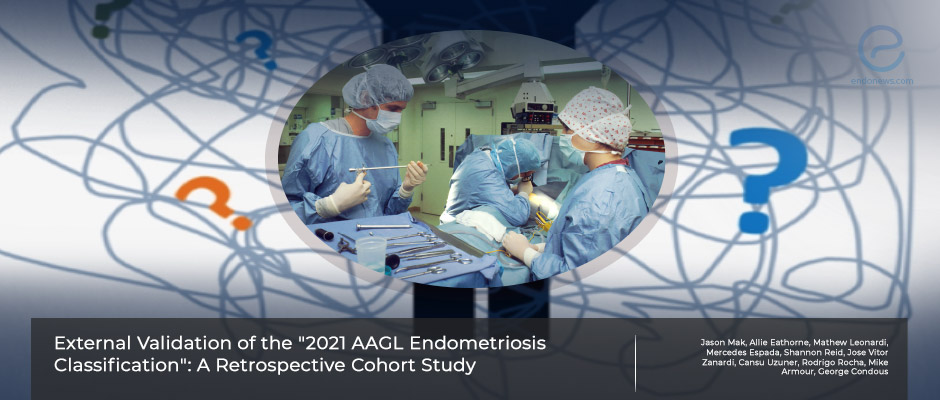Current AAGL Staging System Not Good at Predicting Complexity of Endometriosis Surgery
Mar 23, 2023
The agreement between the stage of endometriosis and the complexity of surgery according to the AAGL is weak to moderate.
Key Points
Highlights:
- Endometriosis Stage by AAGL does not define its surgical complexity well.
Importance:
- There is a need to develop an improved endometriosis classification system that can not only better describe the severity of symptoms, but also predict the level of complexity of endometriosis surgery.
What’s done here:
- Researchers retrospectively analyzed data from 317 women with endometriosis.
- Accuracy analysis was performed based on 3 independent observers' assignments as the index test and surgical complexity level (A–D) as the reference standard.
- Results from the most accurate of the 3 observers were used in the final analysis.
Key results:
- The agreement between the AAGL stage and the level of surgical complexity is weak or moderate.
- The AAGL system does not perform well across the key indicators.
Limitations:
- This is a retrospective study.
Lay Summary
The link between the stage of endometriosis as defined by the American Association of Gynecologic Laparoscopists (AAGL) and the level of surgical complexity is weak or moderate, according to a new study published in the Journal of Minimally Invasive Gynecology.
“Across all key indicators, the AAGL system did not perform as well in this external validation,” wrote the authors of the study, “nor did it outperform rASRM”.
There are different endometriosis classification systems, but these often do not correlate with the severity of the symptoms that a woman with the disease experiences.
In the present study, a team of researchers led by Dr. George Condous from Sydney, Australia conducted a retrospective diagnostic accuracy study to validate the AAGL staging system against surgical complexity and to compare its diagnostic accuracy with the revised American Society for Reproductive Medicine (rASRM) stage.
The researchers analyzed data from a total of 317 patients. Three independent observers staged the disease as stages 1 to 4 and defined the level of surgical complexity.
Statistical analysis revealed that the overall performance of both the AAGL staging system and the rASRM in predicting surgical complexity, the prediction level was moderate and there was no difference between the 2 systems.
The sensitivity in predicting level A surgical complexity for stage 1 disease was 98.5% while the sensitivity in predicting level B surgical complexity for stage 2 disease was 31.2 %. The sensitivity continued to decline for stage 3 disease in which the sensitivity of predicting level C surgical complexity was only 12.3%. However, the sensitivity of stage 4 disease in predicting level D surgical complexity was again high at 95.65%.
The diagnostic specificity for stages 1 to 4 to predict levels A to D in terms of surgical complexity was 64.3%, 90.5%, 94.1%, and 88.1%, respectively.
The positive predictive values were highest for stage 1 disease in predicting level A surgical complexity at 66.3%. The lowest value was seen for stage 2 disease, which could predict level B surgical complexity with a positive predictive value of 27%.
The negative predictive value for stage 4 disease to predict level D complexity was the highest at 99.62%. The negative predictive value then decreased to 98.3% for stage 1 disease to predict level A surgical complexity and continued to drop for stages 2 and 3 to predict surgical complexity B, and C at 92.1% and 60.7%, respectively.
“Results suggest the system is not generalizable,” the authors concluded.
Research Source: https://pubmed.ncbi.nlm.nih.gov/36621635/
endometriosis stage endometriosis surgery advance stage complexity

